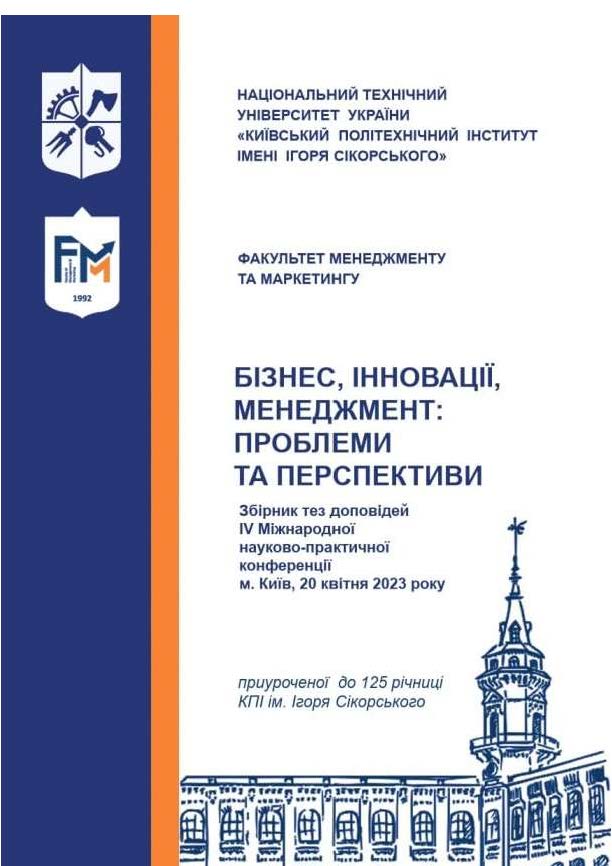GLOBAL CHALLENGES OF THE FOURTH INDUSTRIAL REVOLUTION: TASKS OF MANAGEMENT
Анотація
The rapid development of new technologies and industries, their integration into complex inter-industry systems, led to the emergence of a new technological stage in the progress of human civilization - the Fourth Industrial Revolution. According to Klaus Schwab [1], the main ideologist of the concept of the Fourth Industrial Revolution, its characteristic feature is not just a combination of different technological spheres, but a large-scale and rapid spread of innovations. In such conditions, it is absolutely impossible to realize and predict the results of technological progress and cognitive breakthrough [1].
The phenomenon of the Fourth Industrial Revolution is manifesting itself more and more actively, acting as a powerful factor of changes not only in the field of technology, but also in the social and economic spheres, political-legal and worldview-value spheres, causing the reformation at the level of the world economy and the global political system. The Fourth Industrial Revolution brings a whole set of new challenges, which have been described by many scientists [1,2], at the same time, new opportunities are associated with it. The problem is how to use these opportunities, and who will be able to use them.
In this context, the problem of adaptive capacity of subjects of different hierarchical levels - the state, intergovernmental organizations, individual companies - becomes especially relevant. At the same time, the possibilities of finding adaptation mechanisms at different levels of the management hierarchy must be considered in a coherent, unified system of priorities and tasks. Ukraine, like most countries of the post-socialist group, has already faced a set of problems that make it difficult to realize the opportunities of the Fourth Industrial Revolution. Technological lags in industries, deformations in the structure of the industrial complex, inefficiency of institutions, unfavorable investment climate, underdevelopment of production and innovation infrastructure, significant potential for macroeconomic instability are complex problems that cannot be solved simultaneously with the search for response mechanisms to the challenges of the Revolution. All this means that for Ukraine, entering a new stage of industrialization will be particularly problematic [2]. Under such conditions, challenges turn into destabilizing factors of socio-economic development, rapid changes in the innovation sphere, the external environment of enterprises as a whole, can neutralize even the positive effects of transformations associated with the influence of the Revolution.
Considering these problems from the point of view of the microeconomic level, it should be emphasized that fundamentally new tasks of a strategic nature are faced by enterprise managers. The speed of changes in the external environment of enterprises significantly complicates their solution. The construction of the trajectory of strategic development should focus on ensuring the flexibility of management systems and operational capabilities - these are complex management tasks that require the restructuring of management systems, the introduction of a wide range of management innovations into management practice. The manager's competencies need significant expansion, especially in terms of the combination of organizational-management, security, information and technical-technological components. Achieving such integration of competencies is quite difficult, management expertise acquires a qualitatively different dimension, overcoming organizational and management boundaries.
An important task is also the search for mechanisms of strategic partnership with other companies, the attraction of foreign capital and technologies in various forms, and the introduction of flexible tools for the development of labor resources. It becomes almost impossible to solve the specified tasks without a strategic orientation of management policy, in conditions of a low level of organizational culture. Unfortunately, for many companies, even quite successful ones, such tasks remain unsolved even today. The Fourth Industrial Revolution will certainly give rise to the emergence of new management concepts and practices that will pass the test of time, management activity will acquire a fundamentally new meaning that will overcome established stereotypes. Such problems require a rethinking of approaches to the development of the management potential of companies as a whole.
Посилання
Schwab K. The Fourth Industrial Revolution. 2016. – 172 p. URL: https://www.docdroid.net/DNG1NMW/klaus-schwab-the-fourth-industrial-revolution-2016-pdf#page=2 (дата звернення: 27.03.2023).
Четверта промислова революція: зміна напрямів міжнародних інвестиційних потоків: моногр. / за ред. проф. А.І. Крисоватого та проф. О.М. Сохацької. Тернопіль: Осадца Ю.В., 2018. 478 с.

